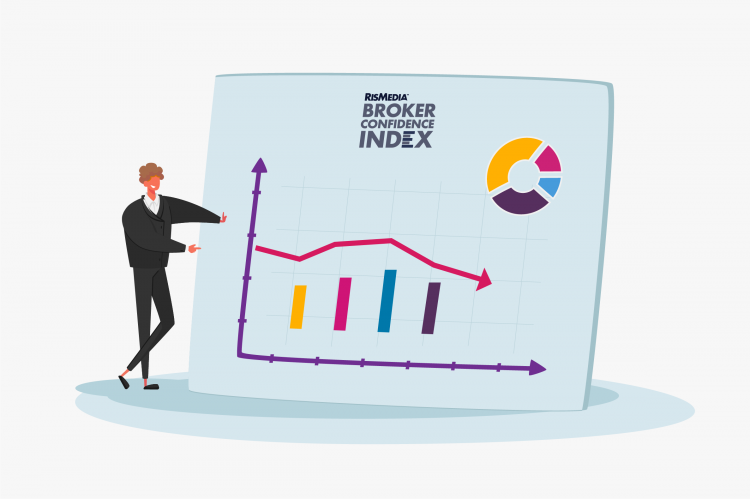The inventory crunch in residential real estate has become palpable among brokers, according to RISMedia’s February Broker Confidence Index (BCI) survey results. And it’s starting to take its toll on the sentiment of real estate professionals.
The monthly survey asks more than 3,000 of the nation’s top brokers how confident they are in the residential real estate market, and in February, the BCI fell for the second straight month to 7.5 (scale of 1-10). This figure is down from 7.9 in January and 8.2 in December. Inventory, however, is not the only headwind brokers face.

Weekly reports from the Mortgage Bankers Association (MBA) continue to suggest mortgage rates are on their way to 4% in the not-so-distant future. The average rate has been slightly volatile in its ascent, with the latest figure coming in at 3.89%, which was down from the previous week’s 3.92%.
John Fitzgerald, broker at Realty Connect, in Merrick, New York, expressed he is less concerned with interest rates given the current market conditions. “We still have a large buyer pool wanting to beat the rate increases. Inventory should be starting to come on the market.”
Likewise, Jennifer Callison, broker/owner at Mike Thomas Associates in Fort Wayne, Indiana, echoed similar sentiments. “Interest rates are still low. Sellers are worried that if they don’t sell now, they may lose their opportunity to take advantage of this market. Their needs are still changing due to the employment environment. We are lucky to live in the Midwest; we are still seeing economic growth.”
Inflation is also cause for concern and uncertainty, with it rising at its fastest rate in 39 years. The Federal Reserve’s likely response to this will be to raise bond interest rates soon, which will likely have a direct impact on mortgage rates. What that will do to homebuyer demand is purely speculative at this point. Demand hasn’t settled at an equilibrium, despite drastically low inventory and rapidly increasing home values and sale prices. So basic economic supply and demand principles aren’t so simple in such an unprecedented housing market.
“The continued lack of supply has really created a bubble,” warned Quincy Smith, broker with ERA Matt Fischer in Yuma, Arizona. “With the equity market starting what appears to be a significant downturn and inevitably higher interest rates to come, I believe we are in store for a prolonged period of price correction. Inflation may be the only saving grace from the correction.”
In addition to asking brokers about their general confidence, we also asked them if the scarcity of inventory was improving in their respective markets. Most (59.6%) said inventory constraints have remained about the same. More than one-third (36.4%) said inventory within their given market has become worse. And only 4% said conditions were improving. The remaining respondents were unsure.
Most respondents agreed that despite the lack of inventory, demand isn’t going away.
“We are still experiencing extremely high buyer demand, but inventory continues to shrink,” said Michael Saunders, broker/owner of Michael Saunders & Company in Sarasota, Florida. “Agents and buyers are feeling stressed and frustrated in trying to meet and exceed buyers’ expectations—with multiple offers ruling the day.”
Chad Ochsner of RE/MAX Alliance in Arvada, Colorado, views this issue in two ways. “It’s a great market for sellers and seller agents. The inventory shortage is terrible for buyers and buyer agents. ”
Another unexpected ripple effect could come from Russia’s invasion of Ukraine. Already we are seeing significant economic impacts to trading and commodity markets that will further drive inflation up, choke supply chains and could have a detrimental impact on the cost and availability of crude oil, which literally fuels the engines that drive the global economy.
Carson Matthews, managing broker at Dorsey Alston in Atlanta, Georgia called attention to this uncertain concern. “Inventory is extremely tight while strong buyer demand is driving competition amongst new listings and pushing prices up,” he said. “The situation in Russia and Ukraine is concerning, and how it will impact the real estate market is unknown.”
Outlook
Warnings of volatility in this index during the winter months were issued in December’s BCI report. And while the index falling to 7.5 is reason to raise an eyebrow in what appears to be an otherwise strong real estate market, particularly after dropping for two straight months, brokers are cautiously optimistic that market stability will remain intact.
“December and January trends gave me some pause,” said Rod Messick, CEO of Berkshire Hathaway HomeServices Homesale Realty in Lancaster, Pennsylvania. “Omicron and agent fatigue led to a lack of activity around the holidays. Agents and consumers were both taking time away from real estate and/or quarantining due to Omicron exposure. A particularly cold stretch in January hasn’t helped. While I’m still bullish on the first half of 2022, I see inflation and interest rate hikes impacting consumer confidence in the short-term leading to a decrease in demand. I think 2022 will be our third best year behind 2021 and 2020.”
“Confidence is declining but the best in the business remain optimistic,” said Dawn Daily, director of operations at House of Brokers Realty, Inc. in Columbia, Missouri. “Many are very worried with the lack of ability for sellers to sell. The need and desire to sell is there but they have nowhere to go.”
 Caysey Welton is RISMedia’s Content Director. Email him with your real estate news ideas cwelton@rismedia.com.
Caysey Welton is RISMedia’s Content Director. Email him with your real estate news ideas cwelton@rismedia.com.












